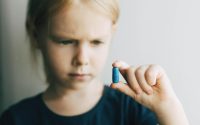COVID vaccine may make Botox less effective: study
Why the long face? Perhaps your Botox isn’t lasting as long because you received the COVID-19 vaccine.
A recent study from a group of researchers in Israel found that filler fanatics visited the person who administered their injections more often after receiving the coronavirus vaccine.
On average, the 45 participants received Botox every 118 days prior to their COVID shot, but after the jab, that number fell to 96 days.
In the study, published in the fall in the Journal of Cosmetic Dermatology, researchers concluded that Botox injections “might be less effective” following the coronavirus vaccine, although more research would be needed to verify that effect.
“While this may suggest that Botox is lasting a shorter amount of time, the study is too small to draw any conclusions,” board-certified dermatologist Marisa Garshick, who was not involved with the study, told Glamour this month.

“This is an interesting study and a good first step in trying to figure this out, because many dermatologists have been talking about it,” board-certified dermatologist and NYU professor Shari Marchbein told Allure, while touting the benefits of the COVID vaccine.
“Those of us who do a high level of cosmetic procedures have seen this firsthand… If your Botox doesn’t work as well, this could be why.”
COVID vaccine aside, research shows Botox immunity can occur on its own.
Approximately 1% to 3% of users develop a Botox-blocking antibody that renders the injections practically useless, according to VeryWellHealth. While this effect is rare, it seems those few beauty queens have gotten used to the toxin responsible for Botox’s effects, and their body no longer responds to it.
If Botox beauts feel like their treatment isn’t working as intended, there is another option: Daxxify. The drug, which is said to last longer than its competitor, was granted Food and Drug Administration approval last year.

The Israel study results arrive as Botox interest is on the rise. The Botox market was valued at more than $6 billion in 2021, continuing a longtime year-over-year growth trend, save for 2020, when the pandemic gained momentum.
The face-freezing method has been a popular remedy for unwanted wrinkles and unsightly facial lines by blocking certain chemicals from entering nerves.
Some users have reportedly experienced unwanted Botox side effects. One woman claimed she could barely open one of her eyes after receiving a dose of the injectable, while another said she was left unrecognizable and deformed.
A 2021 study explored the possibility of the COVID-19 vaccine causing a “hypersensitive” reaction to Botox, finding that two patients who had earlier been vaccinated experienced facial swelling and flu-like symptoms following their facial injections.
The sudden onset of symptoms in the two patients prompted the researchers to issue a “cautionary note” to plastic surgeons while still promoting getting the vaccine.


